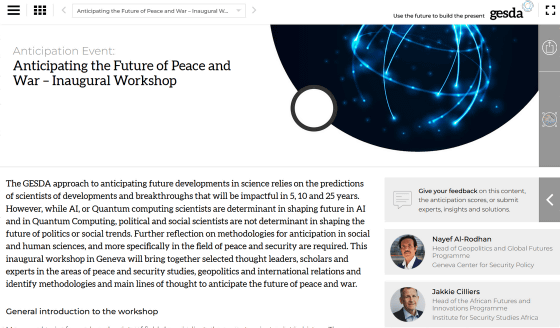Researchers around the world are working to build a ``system that predicts violent crises that shake the world''

Russia's invasion of Ukraine, which began in February 2022, drastically changed the lives of about 200 million people living in both countries, and other countries around the world were also affected by soaring energy prices and suspension of agricultural exports. In this way, violent conflicts at the national level have the potential to shake the world. Meanwhile, researchers around the world are working on a project to build a ``system for predicting and preventing violent conflicts in advance''.
Anticipating the Future of Peace and War – Inaugural Workshop - GESDA Science Breakthrough Radar

Can We Make a System That Will Anticipate Violent Crises?
https://www.sciencealert.com/can-we-make-a-system-that-will-anticipate-violent-crises-these-researchers-think-so
In April 2023, the Geneva Science and Diplomacy Anticipator (GESDA), a Swiss foundation established to make science-based future predictions useful for international diplomacy, will launch the 'Anticipating the Future of Peace and War ( Predicting the Future of Peace and War” workshop in Geneva. At this workshop, 30 scientists from all over the world gathered and discussed building a system to predict future wars and conflicts.
Sirkka Heinonen , a professor at the Center for Future Studies at the University of Turku in Finland, who participated in a future prediction workshop, said, 'We live in a society in crisis, and there are many kinds of undesirable futures. ' said.
This year's Future Prediction Workshop was primarily focused on 'identifying methods to predict the future', but future workshops to be held in 2023 will go even further and focus on 'disrupting human history' He plans to turn his attention to 'concrete movements with hidden possibilities.' Heinonen said, “When we look for future crises, we have to find solutions to prevent them. No,' he insisted.

Although the future prediction workshop was held amidst the shockwaves that Russia's invasion of Ukraine has had in Europe, the participants said that the Russian invasion of Ukraine was not necessarily the main focus. Overseas media AFP said, 'The workshop aims to build a system to predict events years and decades ahead and to advise decision makers on how to get better results in the long term. ' said.
In today's society, where various complexly intertwined factors are bringing about rapid changes, it is a difficult task to predict the future, let alone several years or even months ahead. Meanwhile, experts predict that power will be concentrated in large companies that manage people's data, and that regulations will be introduced to prevent it. In addition, countless scenarios and risks related to rapidly developing AI, such as the emergence of ' killer robots ' and ' emotional AI, ' have also been pointed out.
``There are many possible futures, and there are a huge number of factors that affect them,'' said Heinonen, calling for measures to be taken against potential factors that will have a major impact on the future. increase. For AI, for example, it may be 'too late' if it takes too long to set ethical requirements, assumptions and regulations to guide it in the right direction.
Alexandre Fasel , former Swiss ambassador to the UK and special representative for science at the Ministry of Foreign Affairs, also said that in just a few months of ChatGPT, AI has developed so rapidly that a grace period should be given to consider its impact. Point out that the demand has been raised. He said that in the future, there may be events that will bring even greater changes than ChatGPT, and people need a way to predict the future.

Guéhenno points out that if a similar prediction exercise had taken place 20 years ago, political leaders around the world could have foreseen the disruptive potential of social networks like Facebook. I'm here. In predicting future changes, it is important to identify 'changes in the power structure,' according to which big data companies such as Microsoft, Google, and Amazon have gained more power than many countries in modern society. It seems that ``There is a governance issue for this new center of power, the control of data,'' Guéhenno said.
To realize how difficult it is to predict the future, Fasel recommends thinking, ``Would I have been able to predict what modern society would be like XX years ago?'' For example, as of April 1998, 25 years ago from the time of writing the article, Vladimir Putin was not inaugurated as president in Russia, and there were no smartphones. 'This is the challenge we are working on,' Fasel said.
In addition, if you read the article that summarizes the following ``Children in 1966 predicted what the society would be like in 2000'', you can realize how difficult it is to predict the future.
A movie in which boys and girls in 1966 talk about the future prediction of ``2000 AD'' is amazing-GIGAZINE

Related Posts:
in Note, Posted by log1h_ik







